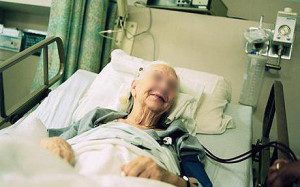The issue of “End of Life Decisions†and when and who makes those existential calls are and have been the subject of considerable controversy, and which I have watched over many years.
 In 2006, I was a participant in an American Society of Healthcare Risk Managers (ASHRM) Monograph (Perspectives on advanced directives) which appeared in The Journal of Healthcare Risk Management, 2006, Volume 26, Number 2. The results of which emphasized the complexity of implementing a clear policy that would be followed by the industry.
In 2006, I was a participant in an American Society of Healthcare Risk Managers (ASHRM) Monograph (Perspectives on advanced directives) which appeared in The Journal of Healthcare Risk Management, 2006, Volume 26, Number 2. The results of which emphasized the complexity of implementing a clear policy that would be followed by the industry.
Years of experience on the battlefield and other mass casualty events have been filled with scenes of agonizing decisions on who gets care and who is set aside to die, ironically combat and mass casualty triage are far less complicated than the legal, moral and ethical environment in civilian settings.
The above Healthbeat article caught the attention of many in the healthcare delivery system in general and religious institutions in particular;  an informal survey of colleagues in the industry indicated that the majority saw this as an early salvo of the new administration to rationalize future denial of costly end-of-life care for the faithful. According to the researcher: “People who use religious coping actually ended up receiving significantly more intensive life-prolonging, burdensome care than those who did not†and that might not be a good outcome, because the life-prolonging care can also continue the suffering and not prevent death. The HealthBeat author, Ira Dreyfuss, added, the study in the Journal of the American Medical Association was supported by the National Institute of Health. It was not clear whether the support meant financial support of the study or acknowledgement /endorsement of the findings.
 Religious beliefs are only one of the many barriers to an early and convenient death for the terminally ill. Frail elderly patients on expensive life-support mechanisms are of great economic value to the healthcare provider community and along with other family and business-related financial issues lead to too many “greed-centered†rather than patient –centered decisions.
Religious beliefs are only one of the many barriers to an early and convenient death for the terminally ill. Frail elderly patients on expensive life-support mechanisms are of great economic value to the healthcare provider community and along with other family and business-related financial issues lead to too many “greed-centered†rather than patient –centered decisions.
Whether these decisions will be replaced by “Bureaucratically-imposed, early and convenient death†remain to be seen.
Comments are Welcome.
JB






0 Comments